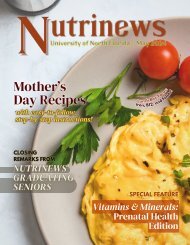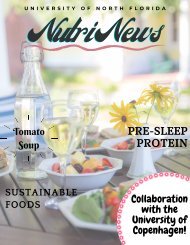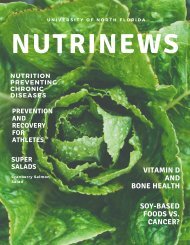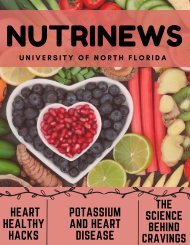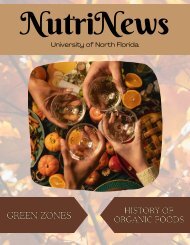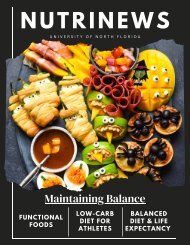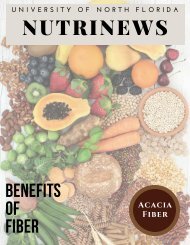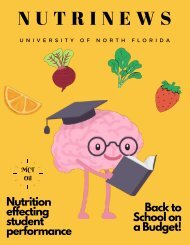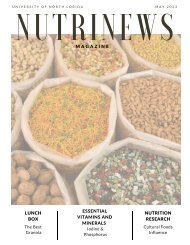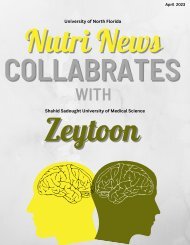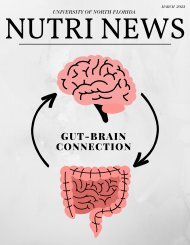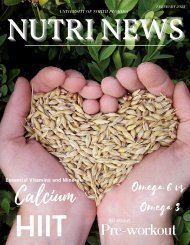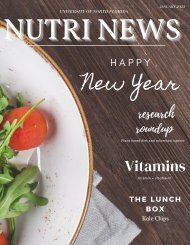Nutri News September 2022
The theme for September is Back to School!!! Articles include nutrigenetics and if a nutrient dense breakfast improves school performance. This issue also includes an easy lunch box recipe and shopping in season with figs. This month’s student spotlight is on our very own Georgina Brace and an interview with Professor Altice.
The theme for September is Back to School!!! Articles include nutrigenetics and if a nutrient dense breakfast improves school performance. This issue also includes an easy lunch box recipe and shopping in season with figs. This month’s student spotlight is on our very own Georgina Brace and an interview with Professor Altice.
Create successful ePaper yourself
Turn your PDF publications into a flip-book with our unique Google optimized e-Paper software.
30<br />
<strong>Nutri</strong>genetics application can be clearly<br />
seen in diseases originating from a single<br />
gene mutation. A classic example is<br />
galactosemia disease; people affected by<br />
this mutation cannot properly process a<br />
type of sugar called galactose, so galactose<br />
builds up in the blood and is toxic. People<br />
with galactosemia benefit from diets low in<br />
galactose, which is found in foods like milk<br />
and dairy products. This is an example that<br />
nutrigenetics can be very useful in providing<br />
each person with a tailored diet according<br />
to their genetic profile.<br />
However, the challenge is in treating<br />
multifactorial diseases, which represent the<br />
leading causes of death globally like<br />
obesity, dyslipidaemia, diabetes,<br />
cardiovascular diseases, and cancer. The<br />
development of these diseases depends on<br />
genetic and external factors, like physical<br />
inactivity, consumption of toxic substances,<br />
environmental pollution, and type of diet. A<br />
genetic factor only increases disease<br />
susceptibility, but it does not mean that<br />
disease will develop.<br />
Considering the complexity of multifactorial<br />
diseases, would nutrigenetics be equally<br />
useful to treat this type of disease? Would it<br />
be correct to carry out dietary interventions<br />
using only the genetic component? Should<br />
nutrigenetics be integrated into clinical<br />
practice? Are we ready for it?<br />
The reality is that nutrigenetics cannot be<br />
applied at this moment rigorously and in<br />
isolation because personalized nutrition not<br />
only depends on our genetic profile, but<br />
there are also many other factors such as<br />
psycho-emotional, social factors, and other<br />
external factors previously mentioned.<br />
Therefore, knowing the genetic profile it's<br />
not enough to create new interventions or<br />
nutritional recommendations.<br />
So, which would be the utility for<br />
nutrigenetics in our present? On the one<br />
hand, knowing about the genetic risk for<br />
certain diseases can be a motivator to<br />
make lifestyle changes and thus prevent<br />
the development of diseases. On the other<br />
hand, nutrigenetics could be helpful to<br />
people who do not respond to specific<br />
dietetic treatments; in this sense, it could<br />
help modify the strategy to provide a more<br />
precise and efficient treatment.<br />
In conclusion, the information that offers<br />
nutrigenetic science is essential to provide<br />
a more precise and efficient nutritional<br />
intervention and predict the predisposition<br />
to future health problems, which represents<br />
a promising preventive tool. However, it is<br />
crucial to consider that the ideal diet for<br />
each person should not only consider the<br />
genetic factor because diet depends on<br />
other non-biological factors like food<br />
availability, psychosocial, cultural, and<br />
economic factors. For this reason, other<br />
disciplines should support nutrigenetics and<br />
be made up of a multidisciplinary team that<br />
correctly translates the scientific<br />
information into nutritional counselling that<br />
provides real benefits for patients.<br />
References:<br />
1. Camp KM, Trujillo E. Position of the academy of nutrition and dietetics: <strong>Nutri</strong>tional<br />
genomics. J Acad Nutr Diet. 2014;114(2):299-312. doi:10.1016/j.jand.2013.12.001<br />
2. Peña-Romero AC, Navas-Carrillo D, Marín F, Orenes-Piñero E. The future of nutrition:<br />
<strong>Nutri</strong>genomics and nutrigenetics in obesity and cardiovascular diseases. Crit Rev Food Sci<br />
Nutr. 2018;58(17):3030-3041. doi:10.1080/10408398.2017.1349731<br />
3. Floris M, Cano A, Porru L, et al. Direct-to-consumer nutrigenetics testing: An overview.<br />
<strong>Nutri</strong>ents. 2020;12(2):1-13. doi:10.3390/nu12020566<br />
4. Vesnina A, Prosekov A, Kozlova O, Atuchin V. Genes and eating preferences, their roles in<br />
personalized nutrition. Genes (Basel). 2020;11(4). doi:10.3390/genes11040357<br />
5. Barrea L, Annunziata G, Bordoni L, Muscogiuri G, Colao A, Savastano S. <strong>Nutri</strong>genetics—<br />
personalized nutrition in obesity and cardiovascular diseases. Int J Obes Suppl. 2020;10(1):1-<br />
13. doi:10.1038/s41367-020-0014-4<br />
6. Guasch-Ferré M, Dashti HS, Merino J. <strong>Nutri</strong>tional genomics and direct-to-consumer genetic<br />
testing: An overview. Adv Nutr. 2018;9(2):128-135. doi:10.1093/advances/nmy001<br />
7. Ferguson LR, De Caterina R, Görman U, et al. Guide and Position of the International<br />
Society of <strong>Nutri</strong>genetics/<strong>Nutri</strong>genomics on Personalised <strong>Nutri</strong>tion: Part 1 - Fields of Precision<br />
<strong>Nutri</strong>tion. J <strong>Nutri</strong>genet <strong>Nutri</strong>genomics. 2016;9(1):12-27. doi:10.1159/000445350<br />
8. Vallée Marcotte B, Cormier H, Garneau V, Robitaille J, Desroches S, Vohl MC. Current<br />
knowledge and interest of French Canadians regarding nutrigenetics. Genes Nutr.<br />
2019;14(1):1-7. doi:10.1186/s12263-019-0629-7<br />
9. Hannon BA, Khan NA, Teran-Garcia M. <strong>Nutri</strong>genetic contributions to dyslipidemia: A focus<br />
on physiologically relevant pathways of lipid and lipoprotein metabolism. <strong>Nutri</strong>ents.<br />
2018;10(10). doi:10.3390/nu10101404<br />
10. Kohlmeier M, De Caterina R, Ferguson LR, et al. Guide and Position of the International<br />
Society of <strong>Nutri</strong>genetics/<strong>Nutri</strong>genomics on Personalized <strong>Nutri</strong>tion: Part 2 - Ethics, Challenges<br />
and Endeavors of Precision <strong>Nutri</strong>tion. J <strong>Nutri</strong>genet <strong>Nutri</strong>genomics. 2016;9(1):28-46.<br />
doi:10.1159/000446347




